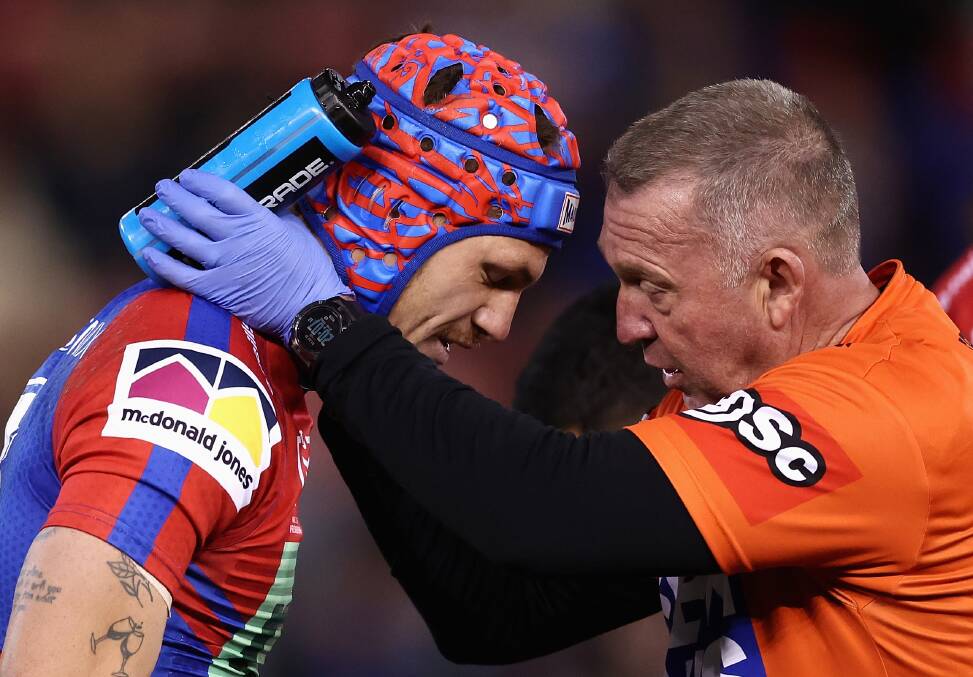
LET me paint you a hypothetical scenario.
Just imagine that instead of being ordered off by the NRL's independent doctor on Friday night to undergo a head-injury assessment (HIA), Knights skipper Kalyn Ponga had been allowed to stay on the field.
And imagine if a minute or two later, he had been knocked unconscious and carried off on a stretcher.
What do you think the narrative would be today?
Somehow I doubt we'd be querying if the doctor had over-reacted. Instead there would be a lynch mob gathering to hold him to account.
Fortunately most doctors, by nature of their profession, are inclined to err on the side of caution, and that's exactly what happened in the 69th minute of Newcastle's season-opening loss to the Warriors in Wellington.
Ponga and Knights coach Adam O'Brien were understandably frustrated afterwards, insisting that Newcastle's most dangerous player had not suffered a concussion.
"I couldn't believe it, 10 minutes to go, game on the line," Ponga said. "I am literally fine." O'Brien added that the medicos were "jumping at shadows".
But Ponga did not run into a shadow. He appeared to collect a hip from 123-kilogram Warriors prop Addin Fonua-Blake flush in the face as he tried to regather a loose ball, and immediately clutched at his head with both hands.
On the vision presented by the TV broadcasters, I'd suggest the NRL doctor had every right to be concerned, regardless of the player involved, or how the scoreboard read.
Only the doctor would know whether Ponga's history of head knocks was a factor in the decision to have him assessed, but if it was, that strikes me as common sense.
The Queensland Origin representative sat out the final six rounds of last season after requiring five HIAs in the space of 14 weeks.
His season-ending concussion, in round 19 against the Roosters, came just three weeks after he was ordered to sit out a game, under NRL protocols, because of a head knock he suffered in Origin II.
After the Origin incident, O'Brien complained publicly about the process, revealing his frustration that "the people that are actually talking to him and doing the assessment don't get to make the final decision".
He believed Ponga should have been allowed to play for Newcastle that week against Gold Coast, who at the time were running last and who the Knights duly beat 38-12, minus their marquee man.
Unfortunately for O'Brien, the Knights, of all clubs in the NRL, are in no position to question how head knocks should be handled by qualified medical professionals.
It was the harrowing sight of Newcastle forward Richie Fa'aoso stumbling around Brookvale Oval in 2011, and being allowed to play on, that prompted the NRL to tighten its concussion protocols in the first place.
Four years later, former Knights and NSW winger James McManus was forced into premature retirement after a spate of concussions.
He subsequently launched legal action against the club but eventually settled out of court, prompting the NRL to declare the matter had "been resolved in the Knights' favour", which is open to interpretation.
Still the Knights hadn't learned their lesson, because two years later they were fined $100,000 ($50,000 suspended) when fullback Brendan Elliot was knocked senseless and allowed to continue playing.
Those incidents, of course, occurred under different coaches and different management, but surely the incumbents would be loath to make the same mistakes?
As Knights CEO Phil Gardner said last year when Ponga was stood down: "Kalyn's welfare is right at the forefront of what we're doing ... but whatever is recommended, we'll add another layer of caution to that."
With that in mind, perhaps the Knights should be grateful for the duty of care shown on Friday night, not querying whether it was overkill.
To see more stories and read today's paper download the Newcastle Herald news app here.







